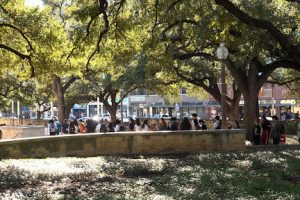Why Student Voter Engagement Matters in Off‑Year Elections
By Ella Denena
Reporting Texas

University of Texas at Austin students lined up to cast their votes on Election Day at the Texas Union. Tuesday, Nov. 4, 2025. Ella Denena/Reporting Texas
November 4th marked Election Day — an off-year ballot allowing Texans to vote on several constitutional amendments.
“With constitutional amendment elections, you’re actually voting on the words that are going to be in the Texas Constitution,” said Joshua Blank, Research Director of the Texas Politics Project. “You’re going to be sitting down and making a choice about the rules that all Texans have to abide by. So in some sense, nothing is more important even though we know that most people don’t vote in these elections.”
Inundated with busy class schedules and extracurriculars, students find themselves turning out in smaller numbers to vote in these elections.
Since there was no presidential race to drive turnout, off-year elections often fly under the radar due to lack of interest.
According to the Travis County Elections, 25% of registered voters in Travis County cast their votes this year, compared to 63% in last year’s presidential election.
Back on campus, University of Texas at Austin students lined up on campus at the Texas Union to cast their votes in the lower-profile election.
“It’s just really important to get out there and make your voice heard, because these are not only going to affect you in the future, but your children, everyone around you,” said Tod Duran, a freshman student voter.
Bruce Burton, a poll worker who has worked elections in Travis County for the past 20 years, urges students to update their voter registration to reflect where they’re living, so that the process of voting can run smoothly.
“It doesn’t matter how many times you move,” said Bruce Burton. “Make sure you go online and make that change when you move. “
One of the key amendments students expressed interest in was Proposition Q — a key issue on the ballot, which proposed raising the city’s property tax rates.
It was expected to generate nearly $110 million if passed.
“Proposition Q is the really important one for me right now,” Duran said.
However, Prop Q failed, meaning programs for homelessness, affordable housing, public safety, and parks will not receive the funding that Prop Q would have provided.
As for what students can do to educate themselves on constitutional amendment elections, Mark Strama, who directs the Annette Strauss Institute, emphasized the importance of seeking reliable information to stay informed.
“You can also be intentional about what you follow on social media, so that you’re following authoritative and credible news sources that will then link you to deeper dive articles about those topics,” said Strama.
Longhorns have access to a free New York Times subscription when logging in with their UT email, which Strama says is a great resource.
In short, a piece of advice for young voters—
“You don’t have to vote on everything. If there’s one proposition that you’re motivated to vote for or against, that’s enough to show up,” Blank said.
All seventeen proposed constitutional amendments passed on Election Day.